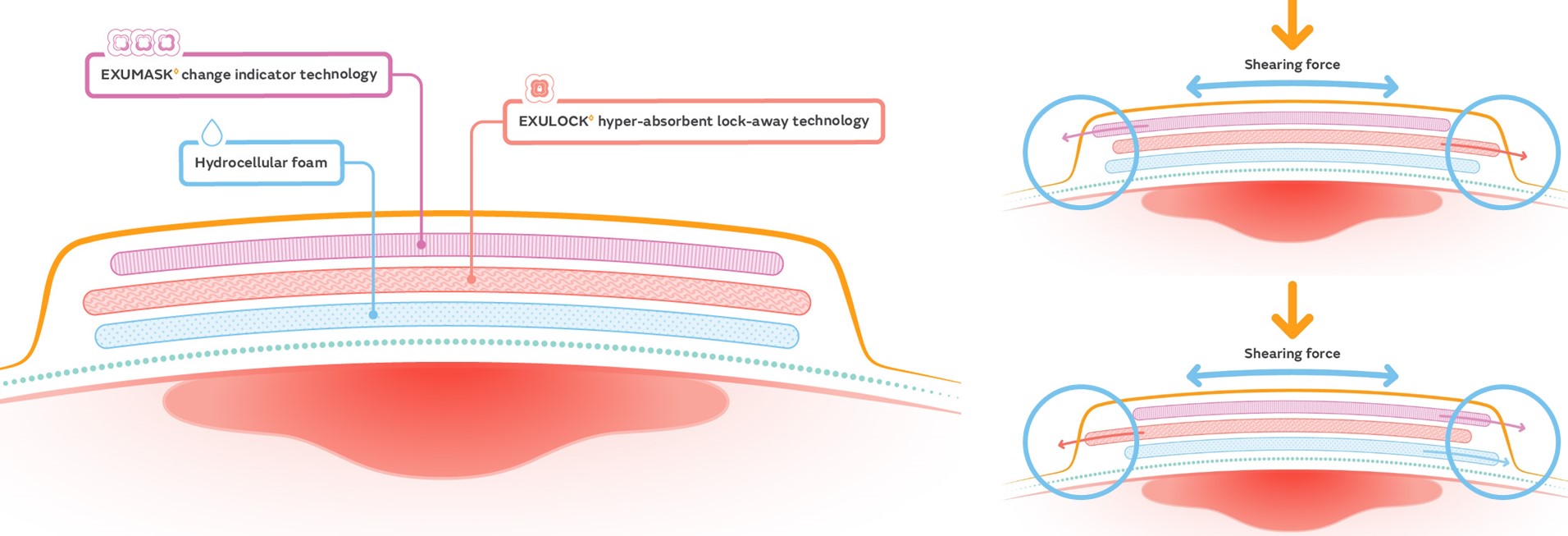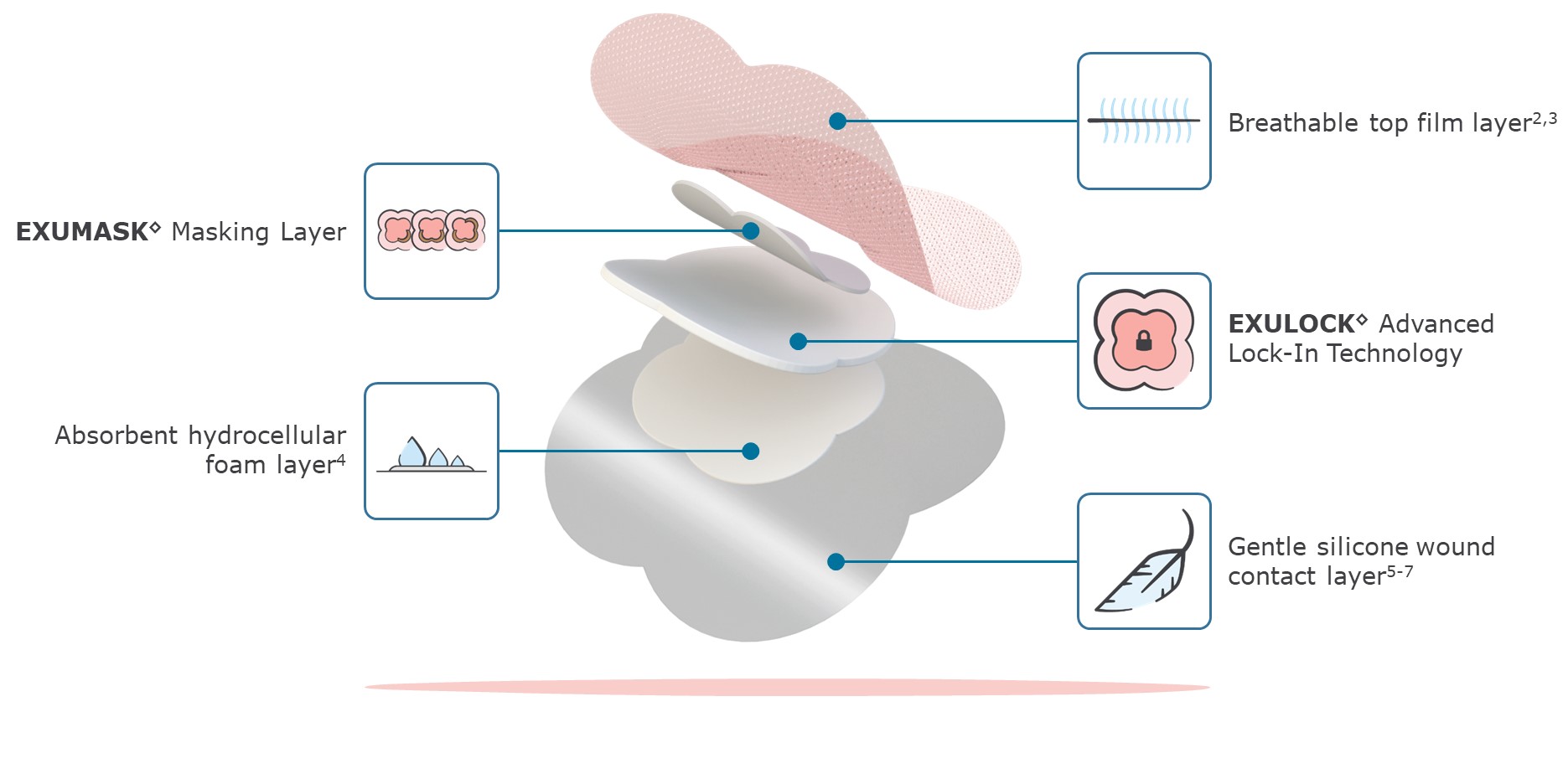Smith+Nephew announces new evidence supporting ALLEVYN LIFE Foam Dressing’s role in pressure injury
Smith+Nephew (NYSE:SNN; LSE:SN), the global medical technology company is pleased to announce exciting data for its ALLEVYN LIFE Dressing in a recent study by Professor Amit Gefen and his research group published in the International Wound Journal,1 that shows a novel mechanism of action relating to pressure injury prevention (PIP).
The study found that due to the independent and non-bonded internal layers of ALLEVYN LIFE Dressing, a layer-on-layer sliding phenomenon occurs and allows for dissipation of mechanical energy that could otherwise be transferred to the patient in a bonded dressing.1
The results show that layer-on-layer frictional sliding of ALLEVYN LIFE Dressing absorbs 30-45% of the mechanical energy, which could help alleviate pressure injury incidence in a patient's skin and underlying soft tissues. This novel mechanism of action further adds to our understanding of how multi-layer dressings such as ALLEVYN LIFE work when used prophylactically for PIP.1

“Based on my extensive, decades-long research in pressure ulcer/injury prevention, I am certain that an effective prevention dressing must contain a shear mitigation mechanism,” said Amit Gefen, Professor of Biomedical Engineering at Tel Aviv University. “My recent study published in the International Wound Journal on ALLEVYN LIFE Dressing revealed the role of its unique internal frictional layer-on-layer sliding which, together with its specific construct and material composition, facilitate effective shear mitigation.”
“Pressure injuries have a high burden on patients and healthcare systems,” said Rohit Kashyap, President, Advanced Wound Management at Smith+Nephew. “This alignment of the laboratory findings with the clinical literature clearly demonstrates the enhanced clinical efficacy of ALLEVYN LIFE Dressings in helping reduce the burden of preventable pressure injuries as one of the only 5-layer foam dressings with independent, non-bonded layers.”

Pressure injuries remain one of the most significant healthcare challenges globally that affects patients of all ages.1 On average, a pressure injury leads to increased healthcare costs of $21,767 per patient and an extra 9.5 days in hospital.8
The study introduced a novel method to thoroughly test the frictional sliding capabilities of the independent layers of ALLEVYN LIFE Dressing. A new metric, frictional energy absorber effectiveness (FEAE), was also introduced to quantify the total mechanical energy dissipation of ALLEVYN LIFE Dressing.1
This newly discovered mechanism of action for ALLEVYN LIFE Dressing further adds, and gives context to, the already existing wealth of clinical evidence9 for its capabilities in PIP that demonstrate significant reduction in pressure injury incidence.*1
To read the full publication please click here. To learn more about ALLEVYN LIFE Foam Dressings please click here.
- ends -
Enquiries
| Media | |
| Dave Snyder | +1 978-749-1440 |
| Smith+Nephew | |
*For category II and above pressure injuries, when applied prophylactically in combination with a standard PIP protocol, versus standard protocols alone
References
- Marché C, Creehan S, Gefen A. The frictional energy absorber effectiveness and its impact on the pressure ulcer prevention performance of multilayer dressings. Int Wound J. 2024; 21(4):e14871.
- Smith+Nephew 2016. Permeability of Hydrophillic Polyurethane Film when in contact with water and water vapour (ALLEVYN LIFE). Internal Report. RD/16/019.
- Tiscar-González V, Menor-Rodríguez MJ, Rabadán-Sainz C, et al. Clinical and Economic Impact of Wound Care Using a Polyurethane Foam Multilayer Dressing. Adv Skin Wound Care. 2021;34(1):23–30.
- Smith+Nephew 2016. Wound Model Testing of New ALLEVYN Life Gen2 wcl Dressing using Horse Serum at a Flow Rate Modelling that of a Moderately Exuding Wound. DS/14/303/R
- Rossington A, Drysdale K, Winter R. Clinical performance and positive impact on patient wellbeing of ALLEVYN Life. Wounds UK. 2013;9(4):91–95
- Clarke R. Positive patient outcomes: The use of a new silicone adhesive foam dressing for pressure ulcer prevention and treatment. Paper presented at: CAET; 2013
- Lisco C. Evaluation of a new silicone gel-adhesive hydrocellular foam dressing as part of a pressure ulcer prevention plan for ICU patients. Paper presented at: WOCN; 2013
- Wassel C, Delhougne G, Gayle J, et al. Risk of readmissions, mortality, and hospital-acquired conditions across hospital-acquired pressure injury (HAPI) stages in a US National Hospital discharge database. Int Wound J. 2020; 1–11.
- Smith+Nephew 2021. ALLEVYN Dressing’s PIP evidence compendium. 31817. Available at: https://smith-nephew.stylelabs.cloud/api/public/content/allevyn-dressings-pip-compendium-2021?v=f6cfe376
About Smith+Nephew
Smith+Nephew is a portfolio medical technology business focused on the repair, regeneration and replacement of soft and hard tissue. We exist to restore people’s bodies and their self-belief by using technology to take the limits off living. We call this purpose ‘Life Unlimited’. Our 18,000 employees deliver this mission every day, making a difference to patients’ lives through the excellence of our product portfolio, and the invention and application of new technologies across our three global business units of Orthopaedics, Sports Medicine & ENT and Advanced Wound Management.
Founded in Hull, UK, in 1856, we now operate in more than 100 countries, and generated annual sales of $5.5 billion in 2023. Smith+Nephew is a constituent of the FTSE100 (LSE:SN, NYSE:SNN). The terms ‘Group’ and ‘Smith+Nephew’ are used to refer to Smith & Nephew plc and its consolidated subsidiaries, unless the context requires otherwise.
For more information about Smith+Nephew, please visit www.smith-nephew.com and follow us on X, LinkedIn, Instagram or Facebook.
Forward-looking Statements
This document may contain forward-looking statements that may or may not prove accurate. For example, statements regarding expected revenue growth and trading profit margins, market trends and our product pipeline are forward-looking statements. Phrases such as "aim", "plan", "intend", "anticipate", "well-placed", "believe", "estimate", "expect", "target", "consider" and similar expressions are generally intended to identify forward-looking statements. Forward-looking statements involve known and unknown risks, uncertainties and other important factors that could cause actual results to differ materially from what is expressed or implied by the statements. For Smith+Nephew, these factors include: conflicts in Europe and the Middle East, economic and financial conditions in the markets we serve, especially those affecting healthcare providers, payers and customers; price levels for established and innovative medical devices; developments in medical technology; regulatory approvals, reimbursement decisions or other government actions; product defects or recalls or other problems with quality management systems or failure to comply with related regulations; litigation relating to patent or other claims; legal and financial compliance risks and related investigative, remedial or enforcement actions; disruption to our supply chain or operations or those of our suppliers; competition for qualified personnel; strategic actions, including acquisitions and disposals, our success in performing due diligence, valuing and integrating acquired businesses; disruption that may result from transactions or other changes we make in our business plans or organisation to adapt to market developments; relationships with healthcare professionals; reliance on information technology and cybersecurity; disruptions due to natural disasters, weather and climate change related events; changes in customer and other stakeholder sustainability expectations; changes in taxation regulations; effects of foreign exchange volatility; and numerous other matters that affect us or our markets, including those of a political, economic, business, competitive or reputational nature. Please refer to the documents that Smith+Nephew has filed with the U.S. Securities and Exchange Commission under the U.S. Securities Exchange Act of 1934, as amended, including Smith+Nephew's most recent annual report on Form 20-F, which is available on the SEC’s website at www. sec.gov, for a discussion of certain of these factors. Any forward-looking statement is based on information available to Smith+Nephew as of the date of the statement. All written or oral forward-looking statements attributable to Smith+Nephew are qualified by this caution. Smith+Nephew does not undertake any obligation to update or revise any forward-looking statement to reflect any change in circumstances or in Smith+Nephew's expectations.
◊ Trademark of Smith+Nephew. Certain marks registered in US Patent and Trademark Office.
文章来源用户投稿,转载请注明出处:/hangye/7879.html

